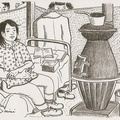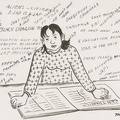Part 2 >>
Gordon Kiyoshi Hirabayashi
Gordon Kiyoshi Hirabayashi’s father, Shungo, together with Grant’s father, Toshiharu, formed the core of the Thomas Mukyokai fellowship. Gordon was born in 1918 in Seattle, but his earliest memories are of living on the farm in Thomas, Washington, next door to his cousin Grant. The family moved to Seattle one winter to escape from the hard farm life, but returned to try farming again at the urging of the Mukyokai group. Gordon’s mother, Mitsu, was concerned over disciplinary problems because young Gordon was picking up bad habits on the streets of Seattle near the Skid Road area. Because she also attended the Kensei Gijuku academy in Hotaka before emigrating, she was a strong promoter of Mukyokai practices. Training in ethics came through example:
A good portion of the influence of the parents didn’t come from their lecturing to me and disciplining me. It was the way they lived. People in the community trusted Dad; their teaching came by their actions, so I got that training one way or another.
Gordon and Grant grew up on neighboring farms. On Sundays, Gordon and his cousins attended the local Union Sunday School:
It was Foursquare-type fundamentalist, Pentecostal. They ran the bible stuff, contest for kids. I got a new testament for memorizing all the books of the Bible. It took me until high school to kick them out of my life, the fundamentalists. I threw out all the literal things of the fundamentalists, but I didn’t throw religion out.
Gordon did well in public school. He took a state exam while in seventh grade, and: “I skipped a grade and went on to junior high school by the age of thirteen.” His mother had high aspirations for him: “Ahh, these guys going to University of Washington – a farm school. You’re going to a school like Yale or Harvard.” He also attended a Japanese language school sponsored by the local Japanese association.
In his youth Gordon belonged to a mixture of Japanese American and mainstream groups, which included the local Boy Scout Troop 53, the Hi-Y (High School YMCA), and the Auburn Christian Fellowship (a Japanese American interdenominational group). He participated in sports at the public schools. He also organized a Nisei basketball team and played in the regional Nikkei league. Later, while at the University of Washington, he had a room at the University YMCA near campus. He received a scholarship to attend the YMCA President’s School, a leadership training program offered at Columbia University. He also joined the American Society of Friends (Quakers) while attending the University of Washington.
When Gordon saw the first exclusion orders posted on telephone poles in the early spring of 1942, during his senior year, he was confronted with a dilemma:
Do I stay out of trouble and succumb to the status of a second-class citizen, or do I continue to live like other Americans, and thus disobey the order? I was not accustomed to disobeying the government. At the same time I was not sure I could abandon my values, goals and self-respect, and still be useful to my family, community and country. 24
At the University YMCA Gordon had numerous discussions with Bill Makino, a Nisei honor student several years his junior. Recalling these discussions, Gordon commented: “At one point I said, this is all wrong. If I go I am giving tacit approval of what’s going on, so I can’t go.” Bill agreed: “I can’t go either.” When Bill informed his parents of this, however, they were shocked: “They gave me the works.” Since he was the only child of an elderly Issei couple, his duty and obligations to his parents weighed heavily upon him. Gordon was pressured by his mother, as well: “We don’t know where we are going and what the government is doing, but one thing we could do is try to keep together.” Gordon, comparing his situation with Bill’s, felt that in his case the family was in good hands, since his brother Ed, who was just graduating from high school, and his next brother, Jim, who was just finishing his sophomore year, would both be with the family. “My parents found it difficult to cope with me and my decisions, but they came around and supported me.”
Gordon dropped out of the university in March 1942, after completing the winter term. He then volunteered for the American Friends Service Committee to help the Seattle Nikkei community prepare for evacuation. Then, on May 16, 1942, Gordon walked into the Seattle FBI office and challenged the “exclusion order” with a four-page typewritten statement he titled “Why I Refused to Register for Evacuation.”
Even though the exclusionary orders bore the imprimatur of the Western Defense Command on behalf of the United States government, I knew I must refuse what I considered to be a gross violation of the Constitution. I must maintain my Christian principles {and} the democratic standards for which this nation lives. 25
Gordon was arrested. The army, however, hoping to avoid such confrontations, was willing to drop all charges provided he leave for the temporary detention center at Puyallup, Washington. He refused and thus remained in jail.
Subsequently, the charge was amended to include violation of the curfew orders. At his trial on October 28, 1942, with Judge Lloyd D. Black presiding, Gordon’s attorney, Frank Walters, argued that his client’s Fifth Amendment right of due process was violated by the exclusion order. The judge dismissed the argument: “We have been engaged in a total war with enemies unbelievably treacherous and wholly ruthless. {The due process argument} should not be permitted to endanger all of the constitutional rights of the whole citizenry.” 26 Judge Black instructed the jury to find Hirabayashi guilty on both counts, which it did. He was sentenced to a year in prison.
On appeal, the United States Supreme Court considered only the curfew verdict, and on June 21, 1943, Chief Justice Harlan Fiske Stone, upholding the conviction, wrote: “The danger of espionage and sabotage to our military resources was imminent, and the curfew order was an appropriate measure to meet it.” 27 Throughout, Gordon remained convinced that he had taken the correct stand: “I fully expected that as a citizen the constitution would protect me. Surprisingly, even though I lost, I did not abandon my beliefs and values.”
After serving out his initial sentence in a federal prison for violation of the curfew and exclusion orders, Gordon went to work for the American Friends Service Committee in Spokane. There he was required to respond to the same special “loyalty questionnaire” administered to all Japanese Americans in camp. On February 22, 1944, he sent it back to the draft board:
This questionnaire, which I am returning to you unfilled, is an outright violation of both the Christian and American principles of justice and democracy. The form, entitled, “The Statement of United States Citizen of Japanese Ancestry,” is a form based purely on the grounds of ancestry….If I were to fill in this form I would be cooperating with a policy of race discrimination. I cannot conscientiously do so. 28
Moreover, as a Quaker and a pacifist, Gordon declined to further participate with the selective service process. The FBI thereby arrested him for draft evasion, and in the subsequent court trial he was sentenced to a prison term at McNeil Island Federal Penitentiary. Ironically, he was there at the same time as his cousin Hank.
After the war, Gordon completed his graduate studies at the University of Washington. He conducted field research among the Doukhobors of British Columbia and received his Ph.D. degree in Sociology. He taught for three years at American University in Beirut, Lebanon, and for three years at American University in Cairo, Egypt. In 1959 he joined the Department of Sociology at the University of Alberta, at Edmonton, where he stayed for the remainder of his academic career.
Gordon is retired and presently living in Edmonton with his wife, Susan. He is a member of the National Board of the Religious Society of Friends.
Notes:
I would like to thank Ako Wooley for her translations of Issei writing; Louis Fiset, Gail Nomura, and Lane Hirabayashi for insightful feedback; and the four cousins, Grant, Gordon, Bob, and Hank, for sharing their lives with the community. The author is a member of the Hirabayashi kin group and the younger brother of Gordon Hirabayashi.
24. Gordon Hirabayashi, Good Times, Bad Times: Idealism is Realism (Argenta, B.C.: Canadian Quaker pamphlet, no. 22, 1985), 3.
25. Personal collection, Gordon Hirabayashi.
26. Peter Irons, The Courage of Their Convictions (New York: Free Press, 1988), 42.
27. Ibid., 43-45.
28. Letter sent to Local Board 4, Seattle, Washington, on February 22, 1944. War Department files, ASW 014.311 WDC Exclusion Orders, 9 March 1944.
* This article was originally published in Nikkei in the Pacific Northwest: Japanese Americans & Japanese Canadians in the Twentieth Century , edited by Louis Fiset and Gail M. Nomura (University of Washington Press, 2005) and reprinted with permission.
** In preparation of the Enduring Communities National Conference (July 3-6, 2008 in Denver, CO), we are posting an essay by James Hirabayashi that was originally published in the book, Nikkei in the Pacific Northwest: Japanese Americans and Japanese Canadians in the Twentieth Century. James Hirabayashi will present a dramatic reading about these four cousins at the National Conference titled, "Four Hirabayashi Cousins: A Question of Identity on July 3 and 4, 2008." Enduring Communities is a project of the Japanese American National Museum.
© 2005 James A. Hirabayashi






